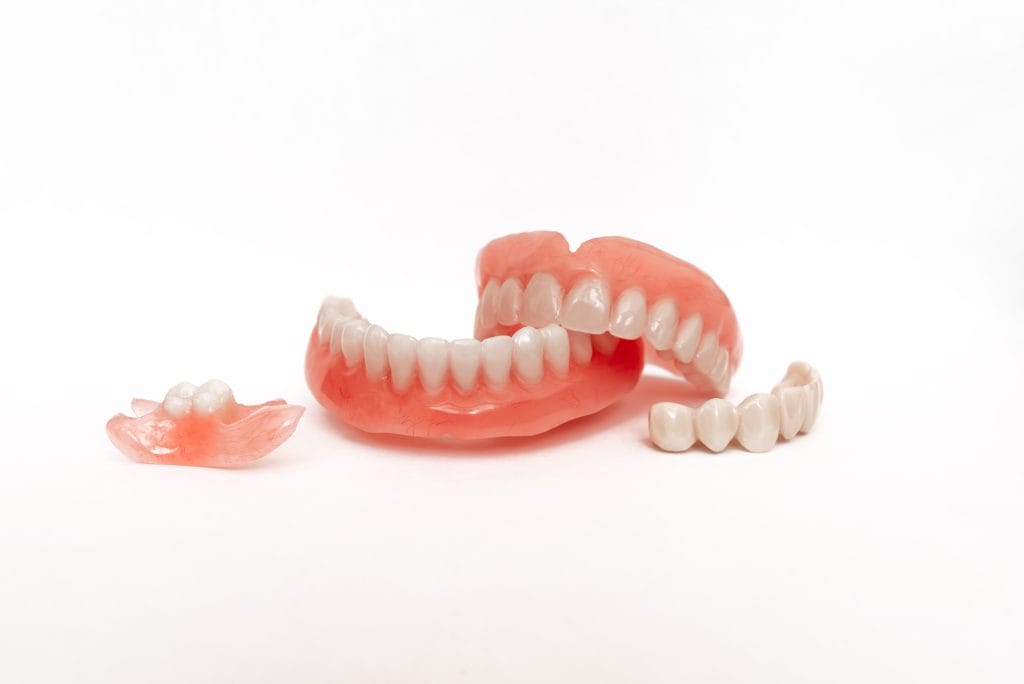Dentures are constructed of strong materials that are designed to hold up to immense pressure and the wear and tear of daily use. Additionally, practicing proper daily denture care and scheduling professional examinations, maintenance, and care with a dentist can help to avoid mishaps and prolong a denture’s useful lifespan. Despite all of this, dentures can sometimes break unexpectedly.
What Can Cause Dentures to Break?
Several factors affect the lifespan of a pair of dentures including:
- Normal, daily wear and tear
- Excessive wear and tear due to bruxism
- Eating hard foods or chewing on ice or hard objects
- Temperature changes that cause the denture materials to expand and contract, affecting their structural integrity
- The consumption of acidic foods
- Improper denture cleaning and care (using harsh or abrasive chemicals)
It can be easy to take your dentures for granted when they’re in good shape and working as expected. When dentures break, however, it quickly becomes apparent just how much we need our teeth for eating and speaking as usual. Going even just a day without your dentures working properly can lead to discomfort, sores on your soft tissues, and even the inability to eat the foods you normally enjoy.
What to Do If Your Dentures Break
If your dentures ever crack, fracture, or break into separate pieces, we strongly encourage you to make a professional repair your first priority. If you are away from home or unable to schedule a repair appointment right away, there are some do-it-yourself methods available for repairing your dentures in a pinch.
5 DIY Tips for Fixing Your Dentures in a Pinch
1. Understand the Risks of Repairing Your Dentures at Home
Before choosing to repair your dentures yourself, it’s important to understand the potential risks of tampering with your dentures.
Your dentist’s or prosthodontist’s dental lab can likely repair your broken dentures, prolonging their lifespan and saving you from having to invest in a completely new pair. However, repairing your dentures at home could potentially render your dentures completely irreparable, professionally speaking.
Plus, at-home denture repairs are typically short-term fixes, meaning it won’t be long before your dentures need to be repaired again. So, the short-term fix might not be worth risking your most cost-effective long-term solution (professional repair with your dental care provider).
2. Know You Won’t Get a Perfect Fit
At-home fixes cannot achieve a perfect fit. Your dentures are custom-designed using highly detailed impressions of your mouth. As a result, they provide patients with a near-perfect fit. When your dentures break and you attempt to repair them at home, you won’t be able to achieve the same quality of fit or the same level of comfort. As a result, you could begin experiencing discomfort, trouble with your dentures fitting securely, and even friction on your soft tissues that could result in painful sores.
3. Try to Consult With Your Dentist First
If you’re in a bind and need a quick fix for your dentures, we strongly encourage you to contact your dentist’s office before attempting to repair your dentures on your own. After you describe the type of damage that has occurred, your dental care provider can give you advice for repairing your dentures. They can advise you on the type of repair kit or glue to use and ensure you minimize further damage that could prevent the possibility of a successful professional repair in the future.
4. Use a Store-Bought Denture Repair Kit
When you need to repair your dentures in a pinch, your best bet is going to be to use a store-bought denture repair kit. Denture repair kits can be found at most pharmacies and grocery stores. These quick-fix kits can help you temporarily repair cracks, fix loose teeth, and mend breaks in your dentures.
For your safety, be sure to follow instructions carefully and bring your dentures to the dentist as soon as possible for a professional evaluation and repair.
5. Be Safe With Super Glue
When dentures break, most people immediately think of using super glue to stick their dentures back together. Most of these glues, however, are toxic and not safe for use internally. Additionally, they are not strong enough to hold your dentures together against the immense pressure exerted by the teeth when chewing.
We don’t recommend using super glue to repair your dentures. If, however, you absolutely must (or you already have) super-glued your dentures back together. Be sure to allow the glue to dry completely before putting your dentures back in your mouth and limit the time you keep them in your mouth to minimize your exposure to potential toxins in the glue.
Request a Denture Repair Appointment as Soon as Possible
With any type of damage done to a pair of dentures, the best course of action is always to see your dentist or prosthodontist for a professional evaluation and repair. Professional repairs ensure high-quality results and a perfectly comfortable, secure fit. We can help you assess your dentures and their overall condition to determine whether a repair or a new set of dentures is the most cost-effective and smart decision. Once the best course of action has been determined, we can send your dentures to a dental lab for repair or send in your specifications for a new set.
To learn more about denture repair or to request an appointment for a denture exam, we welcome you to contact Creekside Family Dental today.


 Meet Dr. Leffler
Meet Dr. Leffler
 Meet the Team
Meet the Team
 Dental Membership Plan
Dental Membership Plan
 Insurance Information
Insurance Information
 Patient Forms
Patient Forms
 Online Bill Pay
Online Bill Pay
 Your First Visit
Your First Visit





